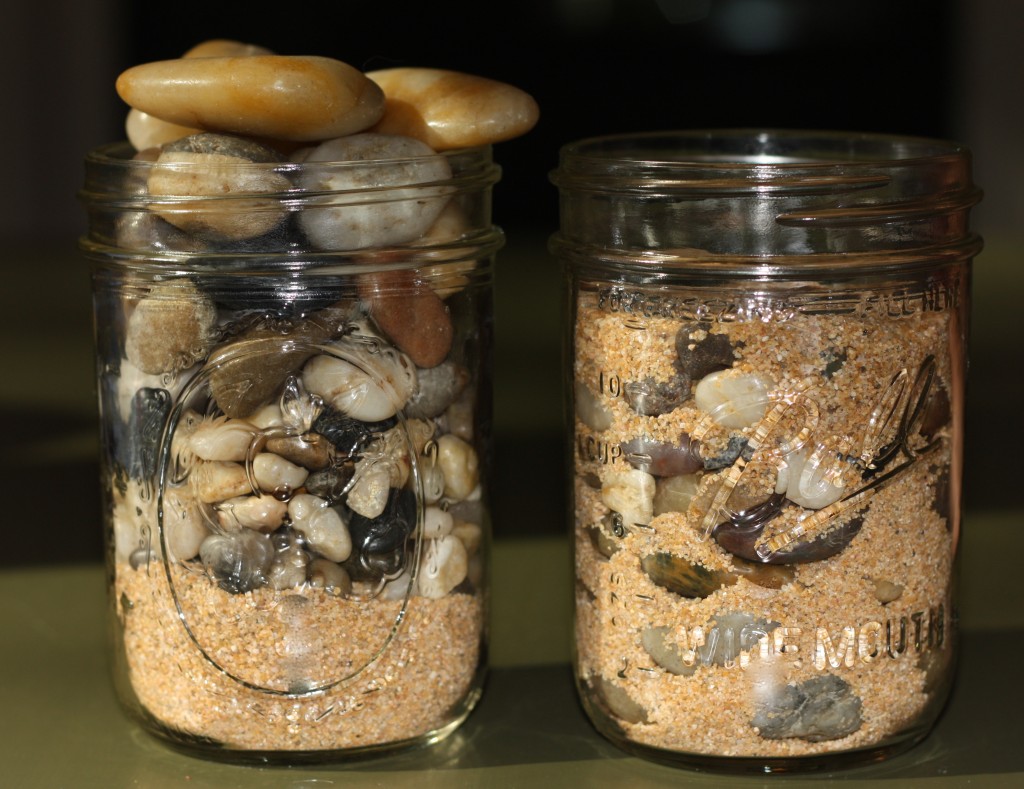
Exploring Life’s Priorities: Rocks, Pebbles, Sand & On Being a Time Billionaire — Aug 2023
August 22, 2023
During the COVID years, we were all given the opportunity to reflect on our mortality and on what’s truly important in life: our fast-paced daily routines came to an abrupt halt, allowing us to recalibrate — to refocus on the priorities in each of our lives. But, while COVID isn’t over, most of us have returned to something closer to pre-COVID routines: for many, travel has resumed; we’re working back in the office at least part of the time; we’re socializing and gathering with others; we’re running our kids around, running errands, running, running, running. The pace of our lives (and our careers) has resumed — maybe accelerated — making it somewhat easy to slip again into our daily rituals and lose track of life’s precious priorities. Family. Health. Friends. Work-life balance or blending.
Last week, I was made aware that a long-time colleague of mine recently died of cancer. She wasn’t extremely young, but she wasn’t exactly old either (I think she was around 70). And since I had somewhat lost touch with her, for me, it seemed very abrupt. So, in the waning days of summer, the news was one of those triggers that caused me to reflect — in ways similar to the COVID days, I guess — on what’s truly important in life.
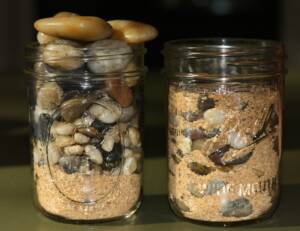 Somewhat coincidentally, the day after my colleague’s death, I was reminded of the fable best told by Stephen Covey of the rocks and the jar. For those who don’t remember (or maybe never heard of it), here’s how the original story is told…
Somewhat coincidentally, the day after my colleague’s death, I was reminded of the fable best told by Stephen Covey of the rocks and the jar. For those who don’t remember (or maybe never heard of it), here’s how the original story is told…
A philosophy professor stood before his class with a large, empty glass jar. He filled the jar with golf ball-sized rocks and then asked his class if the jar was full. Seeing clearly that the jar couldn’t take any more of those rocks, most students admitted that, yes, the jar was full.
But then he took out a bucket of smaller, marble- and pea-sized pebbles and gently poured them into the main glass jar. They cascaded around the bigger rocks, filling in the gaps and crevasses. The professor then asked again: “is the jar full?”. The students, now convinced that nothing else could fit into the jar, more emphatically declared that the jar was indeed full.
But the professor then pulled out a bucket of sand and began pouring it into the main jar. The sand flowed around the rocks and pebbles, filling in previously unnoticed gaps and holes. (I guess the professor could’ve done it one more time with water, but I digress!)
As the story concludes, the professor declared that the jar was a metaphor for one’s life. The rocks signify the most important things in your life, such as family, health, relationships, happiness, and purpose. If the pebbles and sand weren’t added, the jar would still be “full,” and your life would still have great meaning.
The pebbles are the other things that matter in your life — like work and your career, school and your education, your home or car or other personal property. These things are oftentimes necessary, but they’re not as permanent (or essential) to your overall happiness and wellbeing. For example, in most cases, you can easily get another car (or job, for that matter).
And the sand — well, the sand represents all the “small stuff” in life. They are “fillers” — sometimes required, but usually not critical, essential, or important in the big scheme of things. But they oftentimes consume your time and attention. There are probably a million examples of the sand in our daily lives: paying monthly bills (we probably should do it, but it’s not the most important or urgent thing); doing chores around the house; completing any number of tasks at work (yes, they’re all important, but probably not your life’s priority); watching TV; whatever, and so forth. Some of these tasks bring temporary joy but some are a pure waste of time (I’m not sure any of us will put “Watched a Lot of TV” on our headstones!), and others are “necessary evils” — things we should eventually do but aren’t priority (cleaning the kitchen isn’t nearly as important as visiting family).
The moral of this story is this: if you start by putting sand into the jar, you just won’t have room for the pebbles or rocks. Which is the same in life: if you spend all your time on the small and insignificant things, you’ll run out of room (time) for the things that are more important. Therefore, to have a more fulfilling life, you should prioritize and invest more time on what’s important, filling in the pebbles and sand later when you can. Obviously, this lesson applies to both our personal and professional lives.
To hammer the point home, I saw a post by Sahil Bloom a few months ago — a modern-day version of the rock, pebble, sand story. He referenced the concept as being a “The Time Billionaire” (first named by investor Graham Duncan), and it goes something like this: “A billion seconds is slightly over 31 years…[so] when I see, sometimes, 20-year-olds, the thought I had was they probably have two billion seconds left. But they aren’t relating to themselves as time billionaires [and probably should be — they are rich!].”
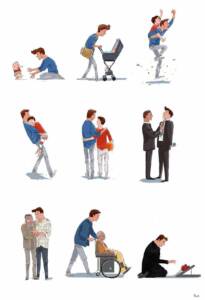 According to Bloom, the point is this: time is our most precious asset (more than money; more than things). When you’re young, generally, you’re a “time billionaire” — rich with time, full of opportunities to spend it in a variety of ways. But so many people don’t recognize the value of this asset until it’s gone (or nearly gone). His advice: “treat time as your ultimate currency” — spend it wisely, because in many ways, it’s the most important thing you have and once it’s gone, you can never get it back. He goes on to say that being a time billionaire isn’t necessarily about having the time, but being aware of the precious nature of the time you have — it’s “about embracing the shortness of life and finding joy in ordinary daily moments of beauty.” It’s also about choosing how to spend your time wisely — rocks over pebbles over sand.
According to Bloom, the point is this: time is our most precious asset (more than money; more than things). When you’re young, generally, you’re a “time billionaire” — rich with time, full of opportunities to spend it in a variety of ways. But so many people don’t recognize the value of this asset until it’s gone (or nearly gone). His advice: “treat time as your ultimate currency” — spend it wisely, because in many ways, it’s the most important thing you have and once it’s gone, you can never get it back. He goes on to say that being a time billionaire isn’t necessarily about having the time, but being aware of the precious nature of the time you have — it’s “about embracing the shortness of life and finding joy in ordinary daily moments of beauty.” It’s also about choosing how to spend your time wisely — rocks over pebbles over sand.
I remember the day my son was born (some of you might too, as I think I wrote about it in one of these columns!). Walking out of the hospital with a seven pound, completely dependent living human is awe-inspiring for a new parent, as I’m sure many of you can relate. You spend most of your waking hours (and many of your sleeping hours!) tending to this tiny person, providing what he needs to survive at first, then providing love, guidance, and support as they grow older and begin their life journey. He’s nearly 21 now, halfway through college and — by nearly all measures — an adult on his way to creating his own life. Where did those 21 years ago?! As the saying goes, “the days are long, but the years are short.”
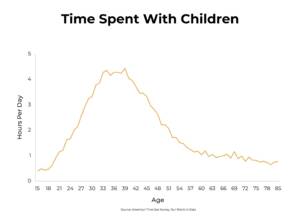 With the help of the American Time Use Survey, Bloom actually he
With the help of the American Time Use Survey, Bloom actually he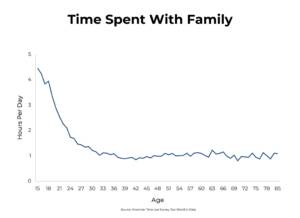 lps quantify it: the time parents spend with their children peaks in your 30s (makes sense, as that’s when most parents have and raise their kids), but quickly decreases to about an hour a day once you hit your 50s, 60s, and 70s. The time you spend with your family (parents, siblings) follows a similar pattern, but a little earlier in life: you spend a good deal of time with your family in your teenage years, but that drops quickly in your 20s, and by your 30s and beyond, you’re spending about an hour a day on average.
lps quantify it: the time parents spend with their children peaks in your 30s (makes sense, as that’s when most parents have and raise their kids), but quickly decreases to about an hour a day once you hit your 50s, 60s, and 70s. The time you spend with your family (parents, siblings) follows a similar pattern, but a little earlier in life: you spend a good deal of time with your family in your teenage years, but that drops quickly in your 20s, and by your 30s and beyond, you’re spending about an hour a day on average.
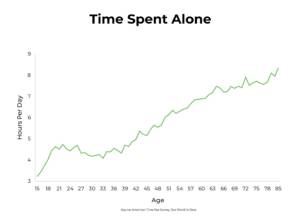 Conversely, the time you spend alone rises dramatically as you age, from three or four hours a day in your late teenage years to five or six hours in your 40s and seven or eight hours in your 60s and beyond. I guess it stands to reason, as your parents (and maybe siblings) are no longer with you, and your kids have moved on with their own busy lives.
Conversely, the time you spend alone rises dramatically as you age, from three or four hours a day in your late teenage years to five or six hours in your 40s and seven or eight hours in your 60s and beyond. I guess it stands to reason, as your parents (and maybe siblings) are no longer with you, and your kids have moved on with their own busy lives.
Reflecting on the data, there are many lessons to these universal trends:
- When you’re young, embrace the time you have with your family — it’s limited, and once you become an adult yourself, the demands of life cause to have far less time to spend with your parents, siblings, and other family members. Prioritize and cherish every moment.
- When you’re a young adult (or a new parent), those precious child-rearing years will fly by. Be present in every moment — slow down and embrace just how wonderful it is to have your children so close. Go to the park; play a boardgame; watch a movie; tell stories; attend their school or sporting or other events; just be together.
- And when you’re an older adult, embrace solitude. Find pleasure in the time you have to yourself: focus on hobbies or things that give you joy. Find things that fulfill you, give purpose to your life. Spend time reflecting.
Life is short; spend it wisely. Focus on your rocks — actually first, find your rocks! — and then fill your jar with pebbles and sand after your priorities are fulfilled. Live your life without regrets. Establish and commit to your priorities; spend time on the things that are important and bring you joy; reduce time on the things that aren’t or don’t. We all have limited time on this earth — only a couple of billion seconds, on average. Make deliberate choices as to how (and with whom) you spend them.
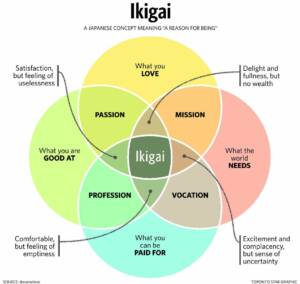 If you want a helpful tool to help you sort through finding balance in your life, check out the column I wrote about 18 months ago on the Japanese concept of Ikigai — a framework to help you consider the intersection in four key questions: 1) what do you love; 2) at what are you good; 3) what does the world need from you; and 4) for what can you get paid. It doesn’t explore so much the importance of family, friends, health, and other priorities in life. But answering those four questions will help you find balance in the activity that most of spend about a third of our days doing: our careers. Here’s to finding your ever-shifting rocks.
If you want a helpful tool to help you sort through finding balance in your life, check out the column I wrote about 18 months ago on the Japanese concept of Ikigai — a framework to help you consider the intersection in four key questions: 1) what do you love; 2) at what are you good; 3) what does the world need from you; and 4) for what can you get paid. It doesn’t explore so much the importance of family, friends, health, and other priorities in life. But answering those four questions will help you find balance in the activity that most of spend about a third of our days doing: our careers. Here’s to finding your ever-shifting rocks.
What other insights/tips do you have on focusing on priorities? Participate in a discussion on this topic: visit our LinkedIn group to post a comment.
Never stop improving!
Brian S. Lassiter
President, Performance Excellence Network
www.performanceexcellencenetwork.org
A Catalyst for Success Since 1987!
Photo credits Matt Douglas, Sahil Bloom

